Hey, there, fellow Guitar lovers!👋
As a seasoned guitar player with years of experience, I know the daunting task of finding the perfect guitar for yourself.
With so many options on the market, it can be overwhelming to know where to start.
But fear not! I am here to guide you through the process with my comprehensive guitar-buying guide.
Whether you’re a beginner just starting or a seasoned pro looking to upgrade your gear, this guide will provide all the information you need to make an informed decision and find the perfect guitar.
So please sit back, relax, and let’s dive into the world of guitar buying together. ✈️
In a Hurry? Here are Our Top Picks
First, Decide what type of guitar you want. I have given a table below explaining when to buy what type of guitar.
| Acoustic Guitar | Electric Guitar |
|---|---|
| Prefer a warm, mellow tone | Want a powerful, distorted sound |
| Enjoy folk, pop, or country music | Interested in rock or metal music |
| Prefer playing chords and singing | Like to play lead guitar or shred |
| Looking for a more portable option | Want to explore a wider range of tones |
Now, let me recommend two of my favorite guitars that are perfect for beginners. They’re one of the best options available in the market right now. Go for them without any second thoughts!
Squier Bullet Strat
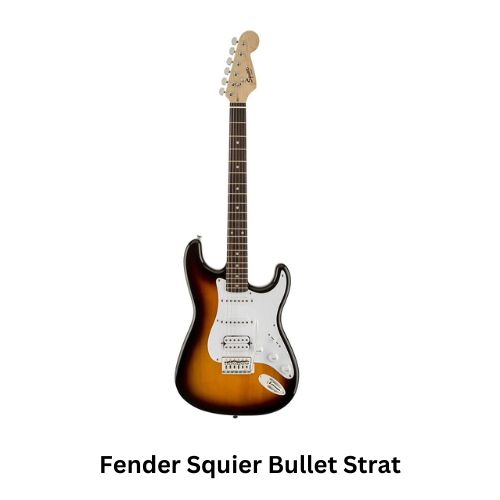
- Best Under Rs. 10,000
Yamaha F310
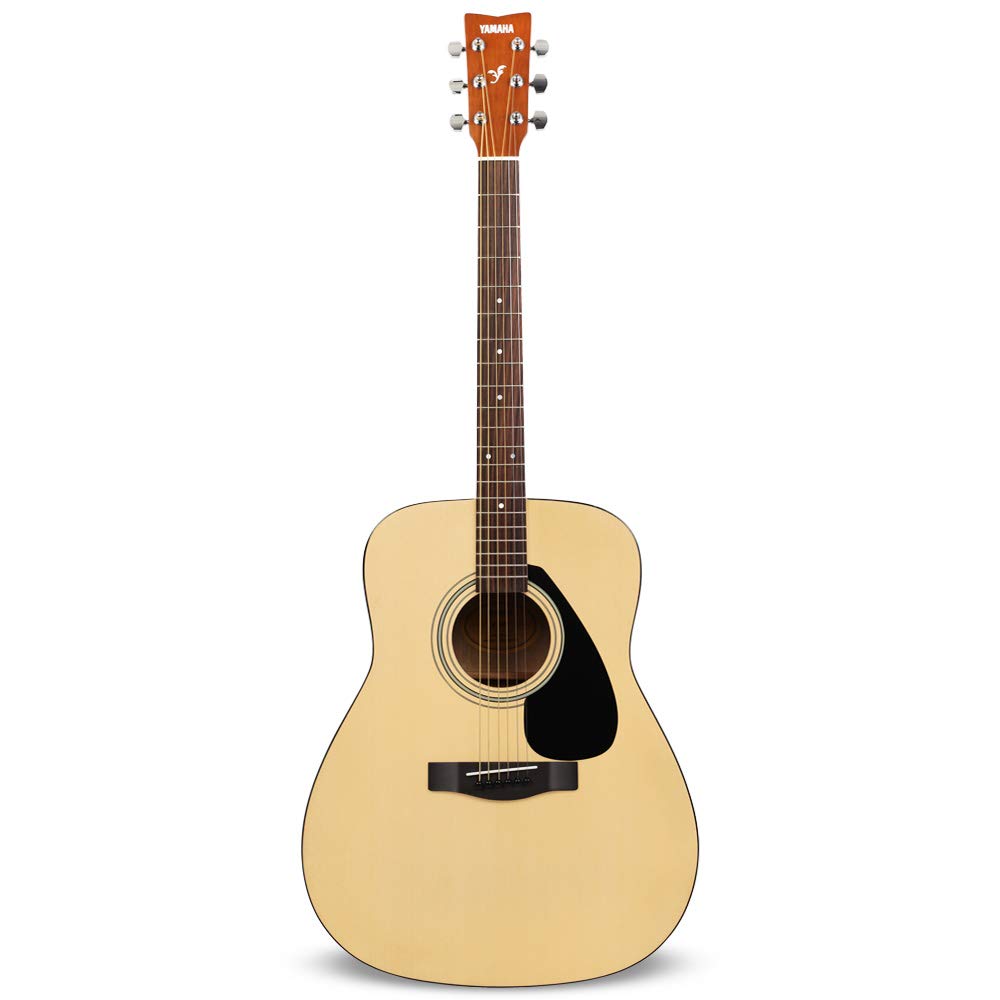
- Best Under Rs. 10,000
Now, if you want to read a detailed guitar-buying guide, let’s begin!
Do You Really Want to Buy a Guitar? Let’s Find Out
Playing the guitar is a very rewarding experience, and I’m excited to help you start your Guitar journey.
Moving on, Let’s discuss a few things, that I think are important and you need to ponder over before buying your first guitar.
Have you considered why you want to buy a guitar?
Are you looking to learn a new skill, start a band, or just want to have fun jamming with your buddies in your free time?
Knowing your motivations can help you choose the right type of guitar and set realistic expectations for yourself.
While playing the guitar is undeniably awesome, you can also try to explore other instruments as well. This will give you the option to decide and finalize the best instrument for yourself.
For example, if you love the sound of strings but find the guitar too complex, consider a ukulele or a mandolin. These instruments are similar to the guitar’s sound but are smaller and simpler to play.
They’re often more affordable than guitars, making them a great choice for beginners on a budget.
On the other hand, if love electronic music, consider investing in a synthesizer or a MIDI controller.
These instruments allow you to create a variety of sounds and effects using Digital Audio Workstations and Plugins.
The choice of the instrument comes down to your interests and preferences.
Feel free to explore different options and try a few instruments before deciding.

Woah, Still here?😮 So, I’m guessing you’ve made up your mind about buying a Guitar. Yippee!
Before you buy a guitar, you must know how it works, eh right?
In layman’s terms, when a string of a guitar is plucked or strummed, it vibrates back and forth. This produces sound waves that travel through the air and then into our ears. This is for Acoustic guitars. Electric guitars have a slightly different mechanism.
If you’re interested in learning in detail how a guitar works, we have a dedicated blog on this topic. You can read it here: How does a guitar work?
If you are confused about any of the guitar terms (jargon) used on this blog, feel free to check out our Glossary Of Guitar Terms, where we have explained the most common guitar terms in simple words.
Types Of Guitars

Below are some of the most common types of guitars that I know of:
- Acoustic Guitars
- Electric Guitars
- Classical Guitars
- Flamenco Guitars
- Resonator Guitars
- Bass Guitars
The two most common types of Guitars are Acoustic and Electric Guitars.
Over 90% of people choose either an Acoustic or an Electric Guitar as their first Guitar.
The below video clearly explains the different types of guitars. I’ll recommend that you watch it before making any kind of decision. Otherwise, you can read our blog on Different Types Of Guitars to get a fair idea about the types of Guitars and which type is the right one for you.
Well, now you know what a guitar is, how it works, and its different types. It is also important to know the different components of a guitar.
For instance, an acoustic guitar typically has the following parts:
- Headstock
- Nut
- Neck
- Fingerboard
- Body
- Soundhole
- Bridge
- Saddle
- Pickguard
Together, these components produce the unique sound of the guitar.
We have a detailed post on the anatomy of a guitar. Please read it to understand the different parts of a guitar in detail and how each part contributes to the overall sound and build quality of a guitar.
I know that the introduction so far has been quite lengthy. But good things take time!
Things To Consider (Guitar Buying Guide)
Let me walk you through the guitar buying guide that has helped me personally. I definitely look at many of the things below when I’m in the market looking for a guitar.
When buying a guitar, you should consider the following things:
- Your Budget
- Playing Style
- Skill Level
- Size and Comfort
- Sound Quality
- Brand and Reputation
- New Guitar vs. Used Guitar
We will dive deeper into each of these aspects in the coming sections. We will consider the factors that influence each of these points such as guitar type, construction – wood and other materials, etc.
1. Your Budget
If you’re thinking about buying a guitar, one important factor to consider is your budget.
Decide your budget upfront and try to stick to it. Trust me, you don’t want to end up overspending and regretting it later.
Of course, the more you spend, the better Quality Guitar you can get.
If you’re looking for a beginner guitar to buy in India, you can find some great options for under Rs. 10,000. Examples include the Yamaha F280, Cort AD810, and the Fender SA-105CE to name a few.
These guitars don’t have all the features and quality that Premium guitars have, but they’re still a great choice if you’re starting out.
Check out our article about the best acoustic guitars in India under Rs. 10,000. I’ve personally played all of these guitars and hence I can safely recommend them to you.
For intermediate players or those looking for a step-up guitar, you can expect to spend anywhere from Rs. 15,000 to Rs. 80,000 or more. These guitars often have better materials, electronics, and craftsmanship, which can result in better tone and playability.
Finally, for professional guitarists or collectors, high-end guitars can cost upwards of several lakhs of rupees. These guitars are handcrafted with the finest woods and deliver exceptional tone and playability.
Don’t be swayed by flashy features or big brand names if it’s not within your means.

Depending on your budget, you can buy guitars of different shapes, sound quality, and features from different brands.
Our website features reviews of the best guitars in every price bracket.
Feel free to skim through the blogs and if you find a guitar that fits your budget as well as preference, you can go over to a nearby store to try it out.
If you like it, you can purchase it online as well.
Now, there are certain merits and demerits to buying a guitar online. Hopefully, you can find a post about it on our website as well.
2. Your Playing Style
Are you a strummer, a finger picker, or somewhere in between?
The way you play the guitar will greatly impact your decision.
For example, if you’re a strummer who likes to play chords and sing along, you may want a guitar with a brighter, more cutting sound that can punch through the mixes. 🎤🎶 Go for a Dreadnought or a Concert size Acoustic Guitar.
If you’re a fingerpicker who likes to play arpeggios and beautiful melodies, you should buy a guitar with a warm and mellow tone. A Classical Guitar would definitely suit your style.
If you’re a Metalhead who’s into shredding go for an Electric guitar with Active Pickups. Popular brands that make great-sounding guitars suitable for such styles are Ibanez, Jackson, and ESP.
Keep in mind that you need to choose a guitar that feels comfortable and natural to you.
Think of the guitar as an extension of you, that allows you to express yourself musically.
Buy a Guitar that matches your style!
Tips for beginners
As a beginner, it’s totally normal to feel overwhelmed by all the different types of guitars out there.
As a beginner, it’s a good idea to ponder over certain questions.
- Think about your favorite bands or guitarists. What Guitar models do they use?
- Who inspires you to pick up the guitar and start playing?
- What is your favorite Genre?
If you’re a fan of “Rock” or “Metal” music and want to play like your favorite guitar heroes, you can buy an electric guitar that can produce a powerful, distorted sound. 🤘
On the other hand, if you’re more interested in folk, pop, or country music and want to play acoustic songs around the campfire, you can go for an acoustic guitar.
3. Your Skill Level
Your skill level has a big influence on what kind of guitar you should buy.
If you are a beginner, I’d recommend you start with a simpler, more affordable guitar that’s easy to play and won’t break the bank. 🏦
As you progress and develop your skills, you can upgrade to a higher-end guitar with more advanced features. 🤩
If you’re an intermediate or advanced player, you may have more specific needs- you may want a guitar with a particular type of tonewood or pickup system that can help you achieve the sound you’re looking for. 🎶
Some guitars have multiple pickups that can produce a wider range of tones, while others have specialized pickups designed for specific genres or playing styles.
Some advanced players may want a guitar with a more complex neck shape or a wider range of frets that can accommodate their more advanced playing techniques. 🎸
Remember that your skill level is always evolving and changing, and so too are your musical tastes and preferences.
The right guitar for you today may not be the right guitar for you tomorrow, and that’s perfectly okay!
Don’t be afraid to try out different guitars and styles of playing as you continue to grow as a musician.
4. Size and Comfort

There are plenty of Guitar Shapes and Sizes to choose from.
Some guitars will look good on you, some not so.
It depends on your body structure as well.
I am a guitar player myself and I can tell you that it’s important to have a guitar that you enjoy playing and that doesn’t cause you discomfort. 🤗
The size and shape of a guitar greatly affect its comfortability.
This is very important if you plan on playing for extended periods or if you are a gigging Musician.
a. SIZE:
If the guitar is too large or too small, it can be difficult to hold properly or easily reach the frets and strings. 👎
That’s why it’s important to consider your body size and the size of your hands when selecting a guitar for yourself.
If you’re slim with an average or below average height or if you have smaller hands, you should consider a guitar with a smaller body size or a shorter scale length.
This can help make the guitar easier to hold and play and reduce the strain on your hands and wrists. 🙌
On the other hand, if you’re a larger person or you have bigger hands, choose a bigger guitar such as the Dreadnought shape Acoustic Guitar.
b. SHAPE:
Another factor to consider is the shape of the guitar’s body.
Some guitars have a more ergonomic shape, making playing more comfortable for extended periods.
🎶Others have sharper edges or less comfortable contours, which can cause discomfort or even pain.
The most common acoustic guitar body shapes are:
- Dreadnought
- Concert
- Jumbo
- Orchestra
- Parlor
Each body shape has its unique sound and feel, so it’s important to try out different shapes to find the one that’s right for you! 🎶👍

Here are some of the most common electric guitar body shapes:
- Stratocaster
- Les Paul
- Telecaster
- SG
- Explorer
d. WEIGHT:
A heavier guitar can be more difficult to hold for long periods, while a lighter guitar can be easier to play and more comfortable to hold. 🏋️♀️
If a guitar is too heavy for you, it can lead to serious back, shoulder, and neck problems, especially, if you perform live on stage.
Don’t be afraid to ask for advice from more experienced players, and remember that your comfort and enjoyment should always be your top priority! 🎉🎸
If you need my suggestions and recommendations, feel free to connect with me on Instagram. The link will be at the bottom of this page.
e. NECK SHAPE:
When it comes to guitar neck shapes, there are a few common ones to choose from 🎸.
The C-shaped neck 🌟 is a popular choice and is generally comfortable for most players. It’s got a nice rounded curve with a little bump in the middle, which makes it easy to grip and play high notes. 🎶
If you prefer a more vintage-style feel, you can go for a V-shaped neck 🎵. This one has a sharp, angular V-shape that’s great for lead guitar 🎸🤘. Keep in mind though, it might not be the best choice for players with smaller hands or those who prefer playing rhythm guitar 🤷♀️.
For those who need more support for their fretting hand 🤚, the U-shaped neck is a great choice 👍. It has a deep curve that creates a fuller grip, making it easier to play chords 🎶🎶.
And if you’re into fast, technical playing (hello, metalheads 🤘🤘), you might want to try out a guitar with a flat neck 🔥. This one has a flatter curve, making it easier to play fast and precise runs 🎸👌.
When it comes to choosing the right neck shape, the best way to try out different guitars and neck shapes is until you find the one that makes you feel like a rockstar 🤘🎸🎶.
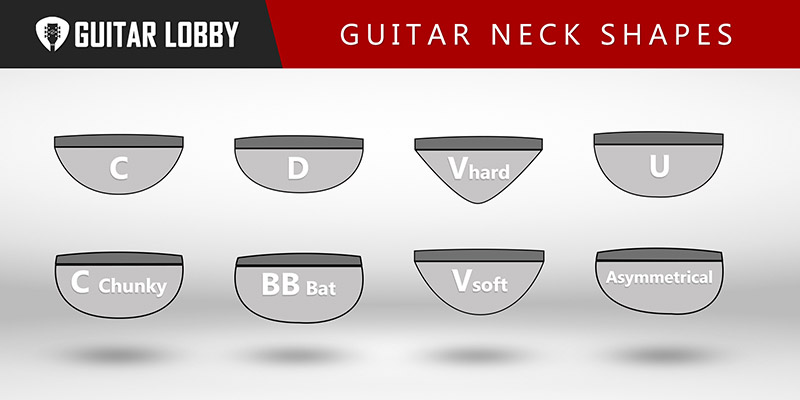
Bonus Tips
✅ If you’re a smaller person or have smaller hands, a guitar with a smaller body size or a shorter scale length may be more comfortable to play. Examples include parlor guitars, travel guitars, and 3/4-size guitars. These guitars are often easier to hold and play and have a brighter, more focused sound.
✅ If you’re a larger person or have bigger hands, a bigger guitar may be more comfortable for you to play. Examples include jumbo guitars and dreadnought guitars. These guitars are great for strumming and playing with a pick.
✅ If you have smaller hands or shorter fingers, a guitar with a cutaway may be easier for you to play in the higher frets. Cutaway guitars have a section of the body that’s been cut away to provide better access to the higher frets.
✅ If you’re a beginner or have sensitive hands, a nylon-string guitar may be more comfortable to play than a steel-string guitar. Nylon-string guitars have a softer, gentler sound, and are often used in classical, flamenco, and folk music.
✅ If you have a smaller frame or smaller hands, an electric guitar may be more comfortable to play than an acoustic guitar. Electric guitars have a thinner body and are often easier to hold than acoustic guitars.
5. Sound Quality
This is one of the most if not, the most, important factors to consider when buying a guitar.
Several factors affect the sound quality of a guitar, and they all work together to create the guitar’s unique tone. Here are some of the most important factors:
- Wood
- Strings
- Pickups
- Bridge
- Nut
- Frets
It’s important to consider each of these factors when choosing a guitar or modifying an existing one.
The 10-Factor Analysis
When it comes to the Sound Quality of a Guitar, I’d like to do something called a 10-factor analysis.
Below are the 10 things that affect the Sound Quality of a guitar:
- Softwood vs Hardwood
- Tonewood Comparison
- Strings
- Pickup
- Bridge
- Nut
- Frets
- Neck Joints & Scale Length
- Action
- Tuning Peg
Remember, each of these things will affect the overall Sound Quality of your guitar. So, do not compromise on these.
If you want to read about the 10-Factor Analysis in detail and how you can buy the best-sounding Guitar for yourself, please check out our blog on the 10-Factor Analysis.
6. Brand
There are so many guitar brands out there, each with its own unique history and reputation.
Below are some things you need to consider when it comes to guitar brands:
🎸 Reputation: Some brands are known for making high-quality guitars, while others have a reputation for lower quality or inconsistency. Do your research and read reviews from other guitarists to get a sense of a brand’s reputation.
🎸 Price range: Some brands are known for their high-end, expensive guitars, while others offer more affordable options. Consider your budget and what you’re willing to spend on a guitar.
🎸 Style of music: Some guitar brands are known for certain styles of music. For example, if you’re a metal player, you may want to look into brands that specialize in heavier music. Ex: Schecter, ESP, Dean, Jackson, etc.
🎸 Personal preference: The brand you choose should boil down to your personal preference. Some guitarists swear by certain brands, while someone like me prefers to mix and match.
Below are some of the most popular Guitar Brands in India.
Best Guitar Brands in India
- Yamaha
- Cort
- Ibanez
- Epiphone
- Fender
- Vault
- ESP
- Gibson
- Jackson
Don’t go for unknown brands just because their guitars are cheap. Cheap doesn’t equal quality in the majority of cases.
Some brands produce better-quality instruments than others.
We have already listed the Best Guitar Brands in India in our blog post and it will help you finalize a brand for yourself, as per your budget and requirements. Do not forget to check it out.
7. New vs Used Guitar
Guitars can be quite expensive, but buying used can help you get a quality instrument at a lower price.
If you’re just starting out or not sure if you’ll stick with playing guitar long-term, it’s a good way to get a feel for the instrument without making a big financial commitment.
✅Below are the benefits of buying a New Guitar:
- The most obvious advantage of buying a new guitar is that it’s never been played. You get that fresh-out-of-the-factory feeling, and everything is brand-spanking new.
- You have the option to choose exactly what you want. If you have a specific make and model in mind, you can get it straight from the music store rather than hoping to find it used.
- A new guitar often comes with a warranty, so if anything goes wrong, you’re covered. Thank God.
❌ Below are the disadvantages of buying a New Guitar:
- New guitars are expensive.
- It can take some time to break in a new guitar and get it sounding its best. If you plan on performing or recording with it immediately, you may need extra time to get it right.
✅Below are the benefits of buying an Old Guitar:
- The biggest advantage of buying a used guitar is that it’s cheaper than buying a new one. You can often get a higher-end guitar for the same price as a lower-end new one.
- Used guitars have a certain character and history that can be appealing to some people. It can be fun to imagine who played it before you and what kind of music they made with it.
- Some used guitars may already have had some modifications or upgrades done, saving you time and money in the long run.
❌ Below are the disadvantages of buying an Old Guitar:
- You never know exactly what you’re getting with a used guitar. It may have wear and tear or hidden damage that’s not immediately visible.
- Used guitars usually don’t come with a warranty, so if something goes wrong, you may be on your own for repairs.
- Finding exactly what you want in a used guitar is challenging. It takes time to find a good deal.
Buying a new guitar is ideal for those who want a warranty and a specific type of guitar.
Used guitars are better for those on a budget or looking for unique tones and vintage instruments.
Inspecting a used guitar before buying is important to avoid potential issues.
Bonus Tips Before Buying a Guitar
- Try before you buy: Always play the guitar before purchasing it. This will help you determine if the guitar feels comfortable in your hands and if the sound quality meets your expectations. If you plan to purchase Online, go over to a friend’s or relative’s house who has that guitar. Try it out at least once.
- Set a budget: Guitars can range in price from a few thousand rupees to lakhs of rupees. Determine your budget before starting your search to avoid overspending.
- Check for defects: Make sure to inspect the guitar for any defects or damage before purchasing it. This includes checking for any cracks, scratches, or warped necks.
- Research the brand: Do some research on the brand of guitar you are interested in purchasing. Look at reviews and customer feedback to see what others have to say about the guitar’s quality and reliability.
- Consider additional costs: Remember that there may be additional costs associated with owning a guitar, such as strings, picks, cases, and amplifiers.
Acoustic vs Electric Guitar – Million Dollar Question
Now, this is something a lot of first-time buyers can get confused about.
Acoustic or Electric.
I’ll break it down for you. Hopefully, you won’t have any confusion after reading this.
If you’re a singer-songwriter or you are someone who loves pop, casual Rock music, country, and indie music, and want to strum some chords while you sing, an acoustic guitar is the way to go.
With an Acoustic Guitar, you don’t need any extra equipment like an amp or cables, making it super portable and easy to play on the go.
If you’re into playing more rock, metal, or blues music and want to crank up the volume, an electric guitar is a perfect choice for you.
With its ability to produce distortion and effects, you can create different sounds and experiment with different styles of music.
If you want to perform with a band or play gigs, you’ll definitely need an electric guitar to be heard over the drums and bass. 🎤
But honestly, there’s no need to limit yourself to just one type of guitar. Why not get both? 🤔
Each has its unique strengths and sounds, so it can be fun to have the versatility to switch between them depending on your mood and musical inspiration.

Acoustic Guitar – Pros and Cons
Pros:
✅ Portability: Acoustic guitars are lighter than electric guitars, making them easier to carry around.
✅ Versatility: Acoustic guitars can be used to songs from different genres such as folk and country to rock and pop.
✅ Tone: Acoustic guitars have a Bright, and natural tone that is often preferred for solo performances and songwriting.
✅ No need for additional equipment: Acoustic guitars don’t require an amplifier or other equipment to be played, making them more straightforward to use.
Cons:
❌ Limited sound range: Acoustic guitars have a more limited sound range compared to electric guitars, as they don’t have the same level of tonal control or effects.
❌ Harder to play: Acoustic guitars usually have thicker strings and higher action, making them harder to play than electric guitars.
❌ Not as loud: Acoustic guitars are not as loud as electric guitars and can be drowned out by other instruments in a band setting.
Electric Guitar – Pros and Cons
Pros:
✅ Versatility: Electric guitars produce a variety of sounds. It’s way more versatile than an acoustic guitar.
✅ Tonal control: Electric guitars offer a wide range of tonal control, from distortion and overdrive to chorus and reverb.
✅ Volume: Electric guitars can be played at a much higher amplified volume than acoustic guitars, making them ideal for live performances.
✅ Easy to play: Electric guitars have thinner strings and lower action, making them easier to play than acoustic guitars.
Cons:
❌ Additional equipment required: Electric guitars require additional equipment, such as an amplifier, cables, effects pedals, etc.
❌ Portability: Though smaller in size, Electric guitars are heavier than acoustic guitars, making them less portable than acoustic guitars.
❌ Tone: This is subjective. Some guitarists prefer the natural tone of an acoustic guitar over the more processed sound of an electric guitar.
❌ More expensive: Electric guitars are generally more expensive than acoustic guitars, especially when you factor in the cost of an amplifier and other accessories.
What Should You NOT Buy? ❌
There are a few things that you should avoid when buying a guitar.
Here are some things to look out for:
- Poor Quality Construction: Stay away from guitars that are poorly constructed or have obvious defects. Look for things like uneven frets, cracks in the body, or loose hardware. These issues can be expensive and difficult to fix and may negatively impact the sound and playability of the guitar.
- Unknown Brands: Avoid buying guitars from unknown or unfamiliar brands, especially if they are priced too well. These guitars are often made with low-quality materials and may have construction issues.
- Too Cheap: While you don’t have to break the bank to get a good guitar, be wary of guitars that are priced too cheaply. Again, these instruments may be made with low-quality materials and could have serious construction issues.
- Outdated Technology: Make sure that any electric guitar you consider has modern pickups and hardware. Old or outdated technology can negatively impact the sound and playability of the guitar.
- Non-Returnable: Avoid buying a guitar that doesn’t come with a warranty and return policy. If it doesn’t have any of the two, it is most definitely a red flag that the seller is trying to sell a low-quality or damaged guitar to you. Always make sure that you have the option to return the guitar if you’re not satisfied with it.
RECAP – 5 Features of An Excellent Guitar
- Great Sound Quality🎵
- Comfortable to Play🐣
- Good Build Quality🎸
- Reliable Tuning Stability🎚️
- Versatile in Tone and Style🧑🎤
How to Get Started with the Guitar?
As someone who’s been playing the guitar for years, I can give some tips to help you get started:
- Start with Basic Chords.
Chords are the building blocks of many songs, so it’s important to learn a few basic ones to get started. You can find chord charts online or in guitar books, and there are many tutorials on YouTube that can help you learn how to play them. - Practice regularly.
Like any new skill, learning to play the guitar takes practice. Try to set aside some time each day to practice, even if it’s just for a few minutes. Consistency is key! - Don’t get discouraged.
Learning to play the guitar can be challenging at times, but don’t give up! Keep practicing, and remember that every great guitar player was once a beginner too. - Have fun!
Playing the guitar should be enjoyable, so don’t forget to have fun with it. Try learning some songs that you enjoy listening to.
While it’s definitely possible to learn to play the guitar on your own, having a tutor or taking an online course can be really helpful, especially if you’re struggling with certain techniques or concepts.
Here are some resources that I’d recommend:
- Guitar Tricks –
This is a popular online guitar lesson platform that offers a wide range of lessons for players of all levels. They have a free trial available, so you can test it out before committing. - Justin Guitar –
Justin Sandercoe’s website offers a ton of free guitar lessons and resources, as well as some paid courses for more advanced players. - Marty Music –
Marty Schwartz has a popular YouTube channel that offers guitar lessons and tutorials on a wide range of songs and techniques. - Fender Play –
Fender’s online guitar lesson platform offers a variety of lessons and courses for players of all levels. - Adit’s Guitar Lessons –
This is a popular Guitar Tutorial Channel in India. You will find plenty of Guitar Lessons on Bollywood songs here. - Local guitar teachers –
If you prefer in-person lessons, try searching for local guitar teachers in your area. Many music stores also offer lessons.
Below is a good website that offers Guitar Lessons for all skill levels.
VISIT PLAYGUITAR.COM
Conclusion
We’ve covered a lot of ground in this guitar-buying guide, and I hope you’ve found it helpful in your quest for the perfect Guitar.
I’ll quickly summarize the entire blog post for you.
Choosing a guitar requires consideration of various factors, such as the type of music you want to play, your budget, and the instrument’s feel.
Guitars can range from electric to acoustic, and from affordable to expensive.
Trying out the guitar before purchasing it is essential to ensure comfort and suitability to your playing style.
So, armed with this guide, I encourage you to go out and find the guitar of your dreams.
I certainly hope that you’ve enjoyed reading our guitar-buying guide!
Don’t hesitate to contact me directly on my Instagram or at hello@leagueofguitars.com if you have any queries or need consultation for your guitar purchase.
FAQs
What’s the difference between an electric guitar and an acoustic guitar?
Electric guitars require an amplifier to produce sound, while acoustic guitars produce sound naturally.
What are the different types of electric guitars and what makes them unique?
Different types of electric guitars include solid body, hollow body, and semi-hollow body, each with its unique sound and characteristics.
How do I choose the right guitar size for me?
Choosing the right guitar size depends on your body size and personal preference.
Should I buy a new or used guitar?
It depends on your budget, preferences, and the condition of the guitar.
How much should I expect to spend on a good-quality guitar?
Prices can range from a few thousand rupees to several lakhs, depending on the quality and brand.
What is a good brand of guitar for beginners?
Brands such as Cort, Yamaha, Fender, and Epiphone are known for their quality beginner guitars.
What is the difference between a solid body and a hollow body guitar?
Solid-body guitars have a solid piece of wood for the body, while hollow-body guitars have a hollow chamber to produce sound.
What are the different types of guitar pickups and how do they affect the sound?
The main types of pickups are single coil and humbucker, each with its sound characteristics.
What should I look for when trying out a guitar in a store?
Look for comfort, playability, sound quality, and overall build quality.
How can I make sure I’m getting a good deal on a guitar?
Research prices, compare models, and consider buying used or waiting for sales.
Can nylon and steel strings be used interchangeably?
Nylon and steel strings are not interchangeable on the same guitar due to their different tension requirements and the way they attach to the guitar.
Does a cutaway reduce the quality of the Guitar Tone?
Having a cutaway on an acoustic guitar may slightly reduce the overall sound volume and resonance, but the impact on tonal quality is subjective and can vary depending on the specific guitar model and the individual player’s preferences. So, Not Really.
What If I need help choosing a Guitar?
Contact me directly on My Instagram: @rohandreamerz

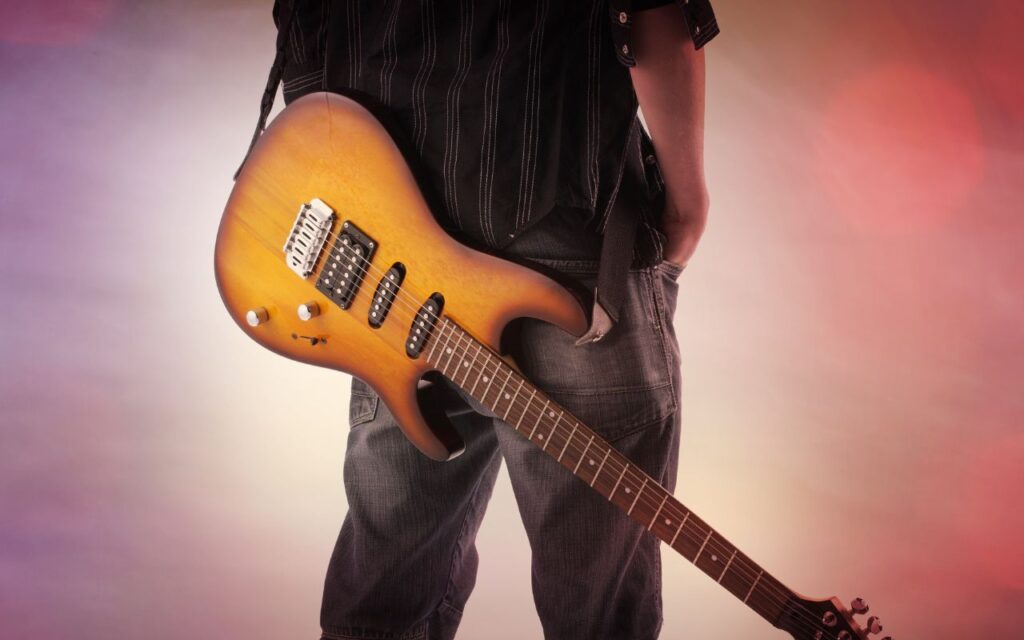

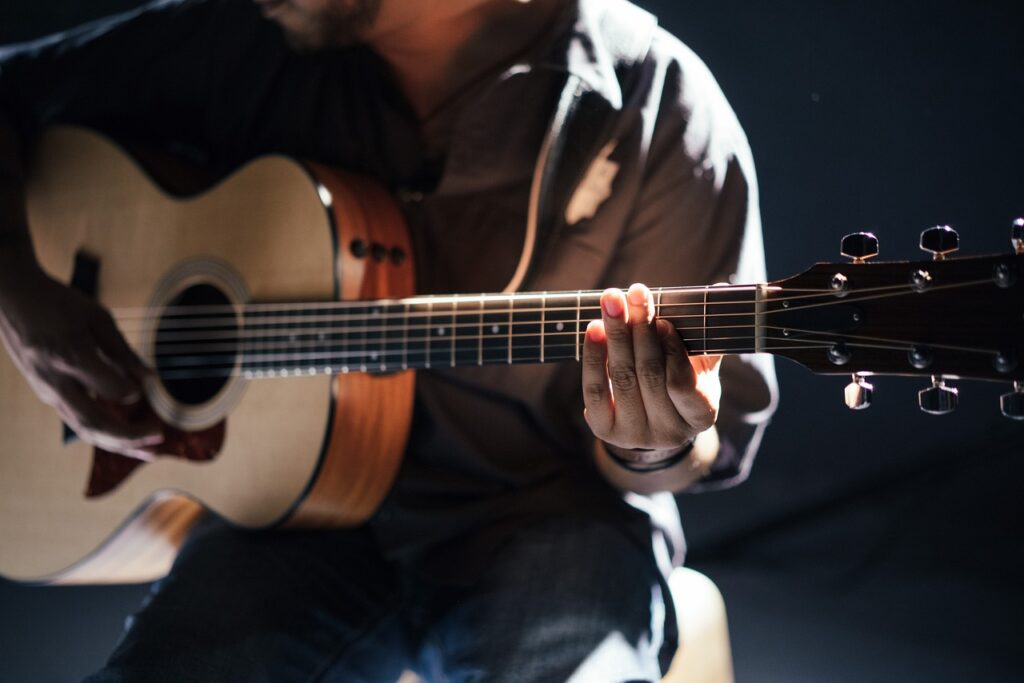
This article offers helpful advice for choosing a guitar, but it doesn’t emphasize the importance of considering the quality of the guitar parts. Opting for cheap guitars often means lower-quality parts that break easily, making playing frustrating. Invest in a guitar with well-made parts like a well-built body for desired sound, a comfortable neck for easy playing, and sturdy tuners for smooth and easy tuning. Remember, quality guitar parts
will ensure your guitar sounds good and plays well for years to come!